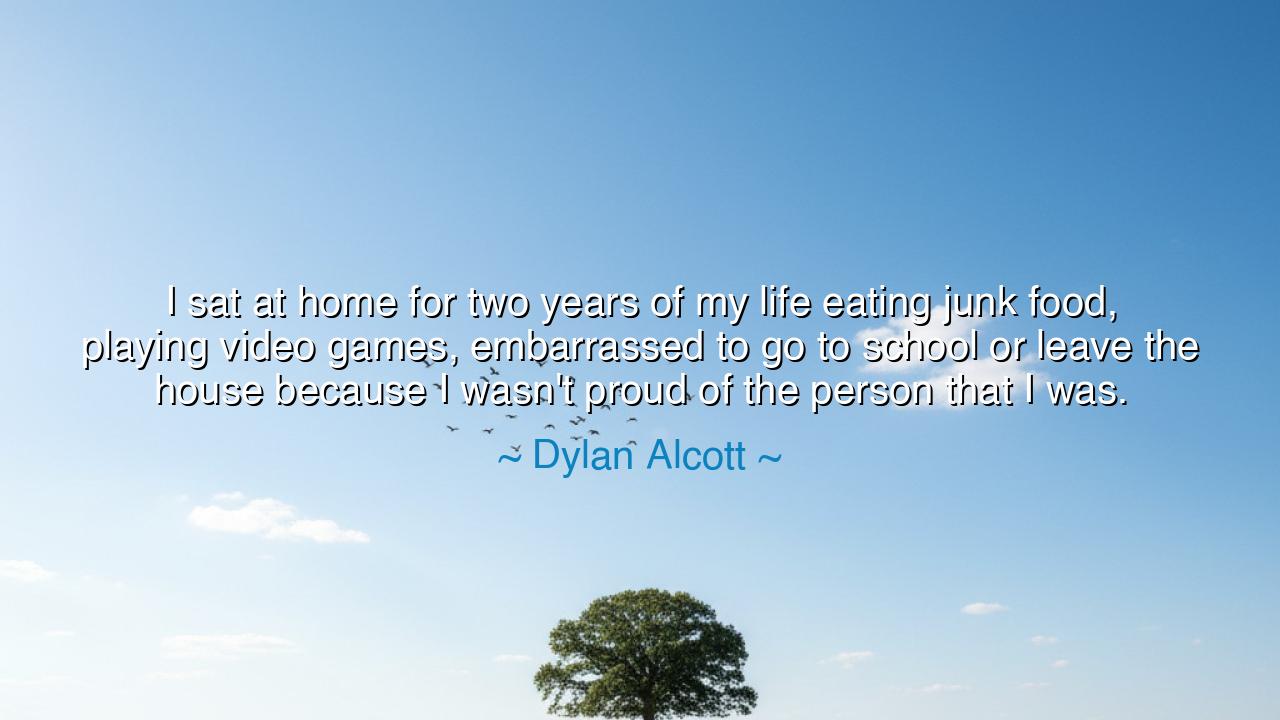
I sat at home for two years of my life eating junk food, playing
I sat at home for two years of my life eating junk food, playing video games, embarrassed to go to school or leave the house because I wasn't proud of the person that I was.






In the words of Dylan Alcott, “I sat at home for two years of my life eating junk food, playing video games, embarrassed to go to school or leave the house because I wasn't proud of the person that I was.” — there rises a confession that is both raw and sacred, the kind of truth that few dare to speak aloud. Beneath its surface of pain and isolation lies a universal story of transformation, of the human soul that falls into darkness and learns, through endurance and awakening, how to rise again. This is not a tale of defeat, but of rebirth — a reminder that shame can be the first step toward self-knowledge, and that even the deepest stillness of despair can become the soil of strength.
To understand these words is to look into the heart of what it means to be human. Dylan Alcott, the celebrated Australian athlete and advocate, speaks here not as a champion, but as a soul once lost in self-contempt, trapped between the walls of fear and self-doubt. His body was confined by disability, but the greater prison was within — the prison of believing he was unworthy of joy or purpose. In his honesty, he reveals the battle that countless people fight in silence: the war between who they are and who they long to become. His story, though personal, is an ancient one — as old as the myths of heroes who wandered through shadow before finding light.
The ancients would have called this period of exile a descent into the underworld, the necessary journey that precedes transformation. Just as Odysseus wandered far from home, facing storms and monsters born of his own choices, so too did Dylan wander within himself — a journey not across seas, but through shame and inertia. For two years he lived in retreat from the world, numbing his pain with small pleasures, “eating junk food, playing video games,” finding momentary escape but no fulfillment. Yet in that silence, something began to stir — the faint ember of self-recognition that would one day ignite into greatness. For the truth is this: the soul that has known despair gains a strength that comfort can never teach.
In every age, those who have risen to greatness have first endured such seasons of obscurity. Consider the life of Nelson Mandela, who spent twenty-seven years in a prison cell, forgotten by much of the world. There too, surrounded by walls, he could have surrendered to bitterness or despair. Yet in his confinement, he found clarity — the understanding that freedom begins not with release, but with the mastery of the self. When he walked out of that cell, he carried within him a calm power born of suffering. So it is with Dylan Alcott: his triumphs on the world stage, his victories in sport and advocacy, are the flowering of a seed planted in those years of silence and shame.
There is a quiet heroism in Alcott’s confession — not the heroism of conquest, but of honesty. To admit that one was “embarrassed to leave the house” is to speak the language of truth, and truth is the beginning of liberation. The ancients revered the Delphic command: Know thyself. Yet they also knew that to truly know oneself is to confront the parts that one fears — the broken, the angry, the ashamed. Dylan’s words remind us that growth begins not in triumph, but in acknowledgment — the moment we face our own weakness without flinching. What he once saw as failure became, in time, the foundation of strength; what he once hid in shame became the story that now inspires others.
His journey also speaks to the modern condition — an age of distraction, where the soul seeks comfort in consumption rather than reflection. To “sit at home for two years” may seem like idleness, yet it mirrors what so many feel today: disconnected from purpose, imprisoned by comparison, numbing pain with noise. Dylan’s awakening came when he chose to stop escaping and to begin living again. He rose from the couch and reclaimed his power — not through perfection, but through persistence. The lesson is clear: the first victory is not against others, but against the voice within that says you cannot.
So let these words be a torch for those who wander in darkness: you are not defined by your lowest moment. The house of shame can become the forge of strength, if you choose to walk through its fire and not remain within it. Begin, as Dylan did, with one small act — step outside, face the day, take responsibility for the life that is yours. The ancients called this act anagnorisis — the moment of recognition, when one finally sees oneself clearly and begins the ascent.
And when that day comes — when you look back upon your own “two years” of hiding and pain — may you see them not as wasted time, but as the crucible that shaped your courage. For as Dylan Alcott’s story reminds us, greatness is not born from ease, but from struggle transformed into purpose. Rise, then, from your self-doubt. Turn your despair into discipline. And remember always: even when the world forgets you, the light within waits — patient, unwavering, ready to guide you home.






AAdministratorAdministrator
Welcome, honored guests. Please leave a comment, we will respond soon